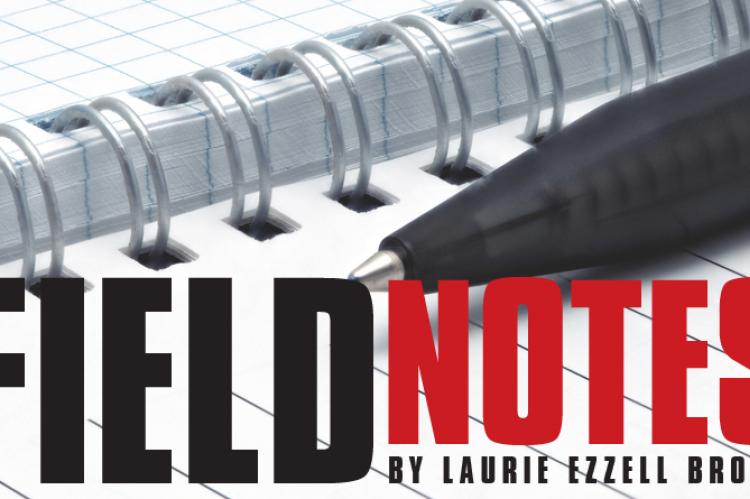Field Notes
A FRIEND AND FREQUENT visitor to The Record office, Harry King, was admiring the result of a recent office reorganization project that we had done with the help of Kim McKinney. Harry had stopped by to drop off his weekly Wildcat Pick ‘Em prediction, and we chatted, as we always do. As he turned to leave, he wondered whether we had misplaced—or worse, disposed of—the rare collector’s item which has been on my desk for as long as I can remember: a bottle from the J.C. Born Bottling Company in Canadian, Texas.
When I was a child, Julius Caesar Born owned a variety store up the street from The Canadian Record. Through the doors was the most wondrous collection of everything from flycatchers to kerosene lamp wicks, and for the younger crowd, metal windup toys and glass marbles.
But Julius Born also made, bottled, and sold Sarsparilla drinks. The thick-walled, green glass bottle that resided on my desk was given to me by a friend, Salem Abraham, and had been kept in a small display case along with a photo of three men sitting on a bench under the shade of the store’s metal awning.
To say it was a treasure would be understatement.
Harry’s question elicited a moment of sheer panic. Was it misplaced? Had it been tossed aside? My quick scan of the office, the bookcases, the file drawers, revealed no clue to its whereabouts.
Growing increasingly concerned, I asked my staff if they had seen it. Mary Smithee gave me an odd look, walked over to my desk, and pointed to the keepsake, still in roughly the same place it had been for years.
Perhaps it was the disorientation I had felt ever since Kim and I boxed up the by-then mile-high accumulation of files and notebooks and newspapers that had collected on my desk. Perhaps it was the lack of sleep I’d had, working long hours to get the newspaper to the printers early that week (I failed), and spending an entire night reading the Office of Attorney General’s 250-page report on the Thomas Brown investigation (I succeeded).
Certainly either was possible, but I think it was actually something far more fundamental that helped me leap to the dire conclusion that the J.C. Born bottle was gone: the simple but elegant power of suggestion and misdirection.
Harry King had no sinister or malicious intent, whatsoever. He, too, was probably thrown by the unfamiliar orderliness of my work space. But his statement of concern that the collector’s item was missing was all it took to convince me that, in FACT, it was missing. It must be missing. Why, Harry said it was missing.
His words—spoken with such certainty—had the effect of convincing me they were true.
One realization led to another.
I had attended the four-hour-long presentation by investigator Philip Klein the previous week. Klein told his audience of probably 150 people—at least half of them “from off,” as we tend to say, including a handful of reporters—that what they were about to hear would be FACT. He repeated the word, over and over, brandishing it as if it were a weapon.
Anaphora is a common rhetorical device, in which a word or expression is repeated, for effect, at the beginning of a number of sentences or phrases. I’m sure I’ve done it myself.
But Klein’s forceful repetition of the word FACT, increasing in volume each time, may also have had the effect of convincing the listener that if he said it, it must, indeed, be FACT…when, in FACT, it was not. Opinion, perhaps. Speculation, maybe.
But I suspect misdirection was Klein’s ultimate intent.
After hearing over and over again what he declared to be FACT, one could almost believe it was. What a perfect way to introduce his newest theory, that Canadian was a hotbed of corruption, from the football team to the coaches to the sheriff— and who knows who else might have been swept up into the highdollar gambling ring that was ordering athletes to throw games or risk being killed.
Klein had just drawn the audience’s attention to one thing, with the intent of distracting it from another. Just like the magician who has asked you where your watch is, while he slips the wallet out of your back pocket. The art of misdirection. Theatrical magic in the form of deception.
Philip Klein picked our pockets that night, and very nearly made us forget entirely what he had promised to tell us, what we had all come to hear: that he was on the verge of solving Tom Brown’s disappearance and death, which occurred in the football stadium parking lot—as he had said all along—at the hands of two of Tom’s fellow students.
It was a sleight of hand that we all watched, but failed to see, cleverly disguised as FACT.
Even when Texas Monthly reporter Skip Hollandsworth pointed out that Klein had suddenly switched theories, and asked which theory he was going with, nobody seemed to notice that he never really answered the question.
We were just sitting there wondering whether Klein had reported Canadian ISD to the UIL, and how soon they were going to confiscate the Wildcats’ ill-gotten State Championship trophies.
Who cares about the iPhone charging case now? Or the wallet that you’re no longer even sure you tucked in your pocket when you left the house that night?
In the words of world-renowned magician Tony Slydini, “If you believe it, they’ll believe it. Magic is something they don’t see.”


